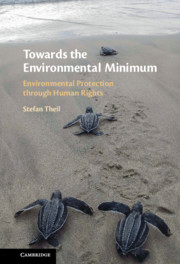Book contents
- Towards the Environmental Minimum
- Towards the Environmental Minimum
- Copyright page
- Dedication
- Contents
- Figures
- Acknowledgements
- Abbreviations
- 1 Introduction
- Part I Introducing the Environmental Minimum
- Part II The Environmental Minimum under the ECHR
- Part III Beyond the European Convention
- Part IV Beyond Human Rights Law
- Appendix: Data Methodology
- Bibliography
- Index
1 - Introduction
Published online by Cambridge University Press: 27 August 2021
- Towards the Environmental Minimum
- Towards the Environmental Minimum
- Copyright page
- Dedication
- Contents
- Figures
- Acknowledgements
- Abbreviations
- 1 Introduction
- Part I Introducing the Environmental Minimum
- Part II The Environmental Minimum under the ECHR
- Part III Beyond the European Convention
- Part IV Beyond Human Rights Law
- Appendix: Data Methodology
- Bibliography
- Index
Summary
The chapter introduces some key terms used throughout the book before offering an outline of the overall argument in favour of the environmental minimum: it is intended to serve both as a primer and a convenient reference point for the following chapters. The core contribution of the environmental minimum is that it translates general and abstract committments to human rights and environmental protection into specific and practical measures to protect the environment. The normative argument for the environmental minimum framework centres on its consistency and compatibility with the normative claims of environmental human rights, and its alignment with fundamental legal principles. What renders the environmental minimum preferable to other conceivable incarnations of environmental human rights is its practical and incremental approach. Crucially, the framework only becomes operational if rightsholders succeed in establishing a specific risk to a human right under an existing protection regime. Thus, the environmental minimum is in principle compatible with the doctrinal position adopted under the examined international and domestic protection regimes, most notably the ECHR.
Keywords
- Type
- Chapter
- Information
- Towards the Environmental MinimumEnvironmental Protection through Human Rights, pp. 1 - 32Publisher: Cambridge University PressPrint publication year: 2021

